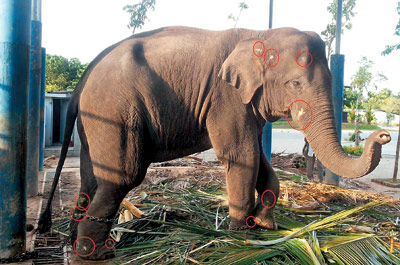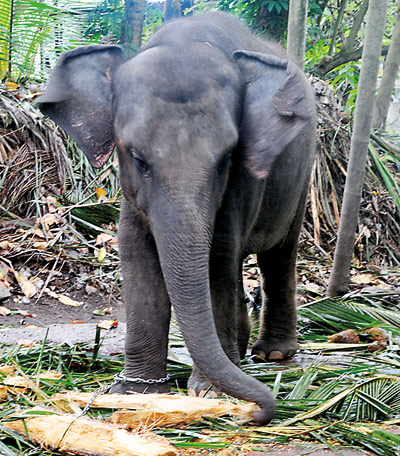News
Wildlife officer connives to ‘relocate’ and sell captive baby elephants

Two of the captive elephants. Pix by Indika Handuwala and Nilan Maligaspe
They posed off as Wildlife Dept officials involved in relocating elephants, while actually, they were poachers capturing wild baby elephants for sale.
Whenever they were accosted by the police, one of them who was a serving Wildlife officer, would produce his official identity card claiming they were on ‘official duty’.
This is what the Criminal Investigations Dept (CID) unearthed while investigating a major racket in capturing wild baby elephants and selling them at prices ranging from Rs 550,000 to Rs 20 million.
Investigations into 41 cases of illegally keeping wild elephants without a valid permit revealed that most of them were captured from the Habarana, Uda Walawe and Yala areas between 2009 and 2014.
Following a string of complaints, OIC CID Senior Deputy Inspector General of Police (SDIG) D.W.R.D. Seneviratne appointed a team to probe the racket in elephant sales,.
A senior CID official said that investigations were triggered by the disappearance of the ‘Elephant Registry’ along with documents pertaining to the annual renewal of elephant permits. The ‘Elephant Registry’ was subsequently recovered with some of the details deleted.
He said, however, documents related to the permit holders were not recovered, hindering investigations.
The investigations centred around some 383 elephants held sans permits by various persons islandwide, in addition to other elephants with permits obtained illegally.
“In most instances where elephants were held illegally, we were told the mother elephant had died of TB and the carcass cremated, which prevents DNA tests for identification,” he explained.
Investigations also revealed how the baby elephants were captured from the jungles, transported to a location in Maharagama, tamed and then sold.The teams that capture baby elephants comprise of hunters who are good marksmen, mahouts, a person with the knowledge of using a tranquilizer and the Wildlife Dept official from the permit section, who is presently under interdiction.

“The hunters who are accustomed to spending time in the jungles, first go in about two weeks before the capture. They monitor the elephants’ movement and target the baby elephant they intend capturing,” he said.
“When the capture is to take place the team moves in. A day and location is carefully selected. At first, the baby elephant was tranquilised, and then gunshots fired into the air to disturb the herd of elephants,” he said.
He said the baby elephant needs to be revived soon to lessen the effect of the tranquiliser, which process usually takes around one to one-and-a-half hours. But it is quite possible that the mother would return looking for the calf followed by the rest of the herd. Therefore, they had been able to capture only two baby elephants in this manner.
Thereafter, they had resorted to tranquilising the mother first.
“The baby elephant invariably returns looking for the mother, when it is tranquilised and removed, leaving the mother behind without reviving it. Some of the mother elephants have died without being revived,” the CID team had found.
The baby elephants are transported without difficulty as the Wildlife officer could claim the elephants are being ‘relocated’.
Most of the elephants were brought to the location in Maharagama where they were tortured before being tamed.
“One method was to tie the elephant and beat it with poles. Another method was to bring in bulldozers and backhoes and make a huge noise to scare the animal,” he added.
“Another form of torture is to tie one end of a rope to the tail, draw it over its back and tie the other end to a foreleg, causing severe pain to the animal, so that it gets tamed,” he added.
He said elephants had been sold to businessmen, temples and VIPs, while some had been used as ‘collateral’ against loans taken by persons involved in the racket.
All the elephants had ‘permits’ issued by the Wildlife Dept, coutesy the officer allegedly involved in the racket.This was the same officer who was supposed to visit elephants given on permits to monitor their wellbeing.
Some of the persons were in possession of permits, but no elephants. On questioning, they told the CID that the permits were in anticipation of obtaining an elephant.
“We believe they were in possession of the elephants, but had hidden them elsewhere to prevent further investigations,” the officer said.
The CID said they hope to take action against several others who were illegally holding elephants.
“Some of the elephants had been presented on a decree by former President Mahinda Rajapaksa. However the due process followed had been faulty as the elephants should have been obtained from the elephant orphanage or the zoological gardens,” he said.
“We are also investigating whether baby elephants had been smuggled out of the country in fishing trawlers, and if the Maldives was a transit point,” the officer said.
Already, some 41 elephants held with illegal permits or without proper documentation, have been detected and taken into the custody of the Wildlife Dept.

